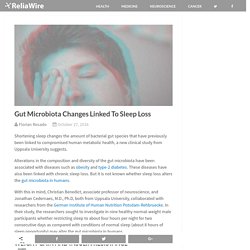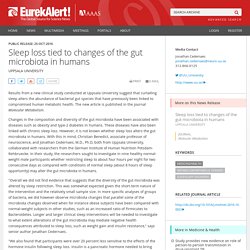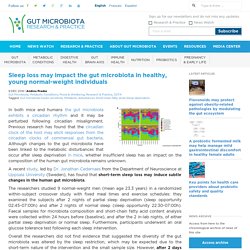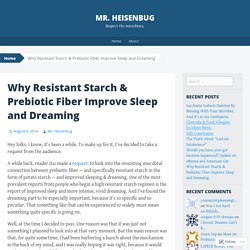

Why Can't I Sleep Part 1.
This is a post from the Gut Critters blog that ended November 18, 2016. Ray Medina gave permission for his material to be copied as long as it was attributed to him and not used for commercial purposes. – kiraonysko
Why Can't I Sleep Part 2. Why Can't I Sleep Part 3. Gut Microbiota Changes Linked To Sleep Loss. Shortening sleep changes the amount of bacterial gut species that have previously been linked to compromised human metabolic health, a new clinical study from Uppsala University suggests.

Alterations in the composition and diversity of the gut microbiota have been associated with diseases such as obesity and type-2 diabetes. These diseases have also been linked with chronic sleep loss. But it is not known whether sleep loss alters the gut microbiota in humans. With this in mind, Christian Benedict, associate professor of neuroscience, and Jonathan Cedernaes, M.D., Ph.D, both from Uppsala University, collaborated with researchers from the German Institute of Human Nutrition Potsdam-Rehbruecke. Senior author Jonathan Cedernaes says: “Overall we did not find evidence that suggests that the diversity of the gut microbiota was altered by sleep restriction. First author Christian Benedict adds: Image: William Brawley CC BY.
Sleep loss tied to changes of the gut microbiota in humans. Results from a new clinical study conducted at Uppsala University suggest that curtailing sleep alters the abundance of bacterial gut species that have previously been linked to compromised human metabolic health.

The new article is published in the journal Molecular Metabolism. Changes in the composition and diversity of the gut microbiota have been associated with diseases such as obesity and type-2 diabetes in humans. These diseases have also been linked with chronic sleep loss. Chronic Sleep Disruption Alters Gut Microbiota, Induces Systemic and Adipose Tissue Inflammation and Insulin Resistance in Mice. What Your Dreams Can Tell You About Your Microbiome. Sleep loss may impact the gut microbiota in healthy, young normal-weight individuals - Gut Microbiota for Health. The researchers studied 9 normal-weight men (mean age 23.3 years) in a randomized within-subject crossover study with fixed meal times and exercise schedules: they examined the subjects after 2 nights of partial sleep deprivation (sleep opportunity 02:45-07:00h) and after 2 nights of normal sleep (sleep opportunity 22:30-07:00h).

Faecal samples for microbiota composition and short-chain fatty acid content analysis were collected within 24 hours before (baseline), and after the 2 in-lab nights, of either partial sleep deprivation or normal sleep. Furthermore, participants underwent an oral glucose tolerance test following each sleep intervention. Overall the researchers did not find evidence that suggested the diversity of the gut microbiota was altered by the sleep restriction, which may be expected due to the short-term nature of the intervention and the small sample size. Because Fiber Wasn’t Awesome Enough: New Science Suggests Fiber Improves Sleep Quality! - The Paleo Mom. You may or may not have seen a brief Facebook post I wrote about a week ago regarding an exciting hot-off-the-presses scientific paper that totally blew me away—so much so that I’ve updated my Go to Bed 14-Day Sleep Challenge to reflect this new information!

The paper is the very first to draw any kind of link between how much protein, fat and fiber you eat and how well you sleep. It’s no secret that I have a serious obsession with sleep (yeah, have you seen my epic, 280+ page e-book, Go to Bed? If not, where have you been?). The complicated relationship that we have with our sleep is a very real, very well-studied thing. We know that our sleep quality and duration have a huge impact on every organ system in the body (Seriously. That’s right: a brand-new and very exciting study just published in the Journal of Clinical Sleep Medicine gives us even more details about what to eat for better sleep. The Science on Sleep & Diet The good news? Why Resistant Starch & Prebiotic Fiber Improve Sleep and Dreaming. Hey folks.

I know, it’s been a while. To make up for it, I’ve decided to take a request from the audience. A while back, reader Daz made a request: to look into the mounting anecdotal connection between prebiotic fiber — and specifically resistant starch in the form of potato starch — and improved sleeping & dreaming. One of the most prevalent reports from people who begin a high resistant starch regimen is the report of improved sleep and more intense, vivid dreaming. And I’ve found the dreaming part to be especially important, because it’s so specific and so peculiar.
Well, at the time I decided to pass.